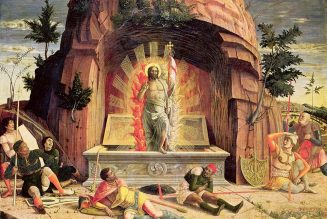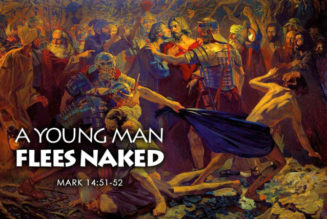
A shield from the competitiveness of the world, a spiritual father sows seeds of hope, encourages forgiveness and teaches how to sacrifice in a way that only a father can do. He answers doubts and reproposes the faith when it is shaken. In this way, a spiritual father helps men and women answer the call of God and step into the greatness for which they are made. In a culture overtly hostile to the faith, such fathers gather islands of humanity and are needed more than ever.
In the midst of the crisis of fatherhood in the Church, a particular obstacle to Christian maturity is the unwillingness to be spiritually fathered. This is where a spiritual father is called to be a prophet today. God calls to awaken a sleepy Church, but an overly technologized ear does not recognize His voice. Many go back to sleep slightly annoyed that their faith has inconvenienced them somehow. Only after repeated instances do a few ask a priest what is going on. If the man is wise, he will instruct a soul to begin a conversation, “Speak, Lord, your servant listens.”
Scandalized souls do not understand why they should make the sacrifices that the faith of their fathers requires. No one has loved them enough to make the case that demands of the Catholic faith are compelling in the face of secular culture. Whereas spiritual fatherhood teaches obedience to God in the face of trials, a nice but heartless “follow the science” promises salvation from all kinds of hardships. We need only conform ourselves to this age.
No inconvenient spiritual worship.
No suffering a renewed mind.
No need for God’s will.
Such going with the crowd promises much, but an Antichrist creates a whole new threat.
Nudged onto this path (very few actually choose it), a fatherless soul worships the work of his hands, and we become what we worship (even if it is AI). A law written into the heart of things, the more power we grasp over the periphery of our being, the less embodied our spirits. We gain autonomy at the expense of love, safety at the price of genuine encounters. Recent social upheaval shows us that those who pursue this morgana lose themselves in resentment and anxiety. Life becomes the pursuit of escapes or a blame game. Such fatherlessness ends in boorishness.
A spiritual father is a man convinced that Jesus Christ is the only real answer to the complexities and challenges of life. He sees only sons and daughters, not cogs in the wheel of progress. Knowing the greatness of their dignity, his heart is pierced by their plight. He is a prophet who defends the heart against commercial nudging and the truth against the lack of faith that undermines the Church. These men father souls to encounter the risen Lord in a way that answers the deep questions of the heart. They evoke an obedient love because they have learned obedience through what they have suffered for the truth.
To be fathered spiritually is to enter into the horizons of the obedient love of Christ. This is connecting with others beyond competitive exigencies, to reconnect with those who came before us and to rediscover that there is something very good about the world we live in. This obedient reconnection with the sacred happens through the Church when spiritual fathers open these doors in a manner that helps people find where they belong.
Hans Urs von Balthasar was a true spiritual father. He described Christendom shipwrecked in a storm of secularism. He understood that we need to find a new way forward because, regardless of what has happened to Christian society, the Christian faith goes on, nonetheless, unto the end of time. We must find a way to be Christian in these post-Christian times. In the technocracy of modern life, we need spirit-filled men who can teach us how to embody the obedience of Christ and find communion with each other even in the face of our contemporary loneliness.
How to survive the shipwreck and pass on the truth for the next generation? He describes forming an island of humanity huddled around a spiritual father, a priest, who respects the tradition. Prophetically, his words speak to the terrible alienation we have come to know in the Church after COVID. He does not see an obstacle but an opportunity in these circumstances. He suggests that our loneliness can become a participation in the loneliness of Christ on the cross. Such obedience, such hearing of the Word, is the fruit of spiritual fatherhood.
All the same, I wonder whether forming an island of humanity gets to the task of a spiritual father today? Believers have more of a sense of being caught behind enemy lines. It seems time for fathers to man up and engage the fray. We need a Gandalf to defend against not just a storm but from enemies who are bent on killing us. Spiritual fathers are called to courage because sons and daughters need courage more than ever.
Matt Feeney is on to something in “Little Platoons: A Defense of Family in a Competitive Age.” A father and husband pits himself against the world to protect the sacredness of family life. He means all those intimate conversations, shared stories, jokes, mirthful memories (and also a fair share of difficult ones too). All of this needs to be protected against all encroaching competitiveness of the outside world. For there are forces in our culture that do want to breach the walls and make absolute claims over those we love. His point is that – as did Viking warriors – the time has come to fight for hearth and home.
Fatherhood is about this specific battle. Protected in this way, a household becomes a home, an enclave from the wild world, a place of belonging, a safe place to remember who we are and why we are. In the family, we enjoy, build up and bear with one another in this short time that we have together. Against outside interests and social forces, even good natural fatherhood shelters this frail passing instance of Eden so that all that is tender and good in the heart might flourish.
What is true of the father of a family is true of a spiritual father in the Church. If the warmth of the family hearth feeds the heart with hope, the sincerity of our relationships in Church can also open up a future for those who share our faith. For the contemporary family, this is about being smart about how the culture attempts to nudge us and putting up good boundaries. In the Church, this means fathering souls in hope, reconciliation and sacrifice.
The Church is a place for the sacred: tender-hearted devotion, true spiritual friendship and a haven for hope. A spiritual father is the builder and defender of this sacred place in the world. In priestly ministry, this is accomplished primarily in the liturgy and sacraments of the Church. In spiritual direction, what liturgical worship makes known is brought to bear in the real-life circumstances of spiritual sons and daughters. While women can offer souls spiritual motherhood, only a man can father another soul in this way. For each baptized soul newly expresses the mystery of the whole Church as a son and daughter of God, and to a spiritual father it belongs to accompany such sons and daughters and to defend them against every attitude that might threaten their flourishing.
Last fall, a movie called “Prophet” hit our theaters here in the Bay Area. The story of Cardinal Stefan Wyszynski, primate of Poland who formed a platoon for the Church against the heartless idealism of his day. In many ways, he was a spiritual father for St. John Paul II. Powerful scenes referring to actual historical events depicted his spiritual fatherhood through sowing seeds, reconciliation and sacrifice.
While serving as chaplain for the Polish Underground in Warsaw, the movie depicts Wyszynski looking out on the battlefield as a poor farmer throws seed on his field in the middle of a firefight. In the midst of explosions, the priest tries to stop the farmer, “Why are you sowing seed in the midst of a battle?” The farmer replies, “If I do not sow, our fields will be barren.”
The exchange speaks to hope. Fathers sow seeds now even in the midst of danger for the sake of what comes later. If we allow it, this glimmers with the selflessness of the generations that have come before us. As an image of spiritual fatherhood, it speaks to preaching the Gospel in season and out of season.
How does a spiritual father sow seeds? To impart a truth, a father must listen to the heart. Listening plants seeds even in situations that seem completely helpless. A spiritual father performs this task because he knows that current circumstances will not last forever. Instead, he prepares for what comes after the current crisis no matter the cost to himself. This is the work of the lowly, and spiritual fathers are lowly.
To celebrate the 1,000-year jubilee of Christianity in Poland, the movie shows Wyszynski preparing the Polish Church for consecration to Our Lady. As part of the preparation, he asked the faithful to forgive the Germans during the Nazi occupation. Those in political power were furious and accused the episcopacy of betraying the rest of the country. Rather than reacting defensively, the Cardinal quietly promoted processions to Our Lady of Czestochowa. Indeed, devotion to Mary opens up new possibilities of peace when all else seems lost. As a spiritual father, he pushed for reconciliation at the cost of the very people he served misunderstanding his intentions. In the end, he renewed the consecration of Poland in a way that inspired a new generation of leaders, including the future John Paul II. This is the work of a peacemaker, and spiritual fathers are peacemakers.
When government soldiers killed protesting workers, the movie shows one more dimension of spiritual fatherhood. Officials attempted to blame Wyszynski for stirring up fanaticism. He refused to take responsibility for something that he did not do. Instead, through the Mass, he would join the suffering of the Polish workers to Christ’s work of atonement. He would do so not only for the redemption of Poland, but also for the salvation of the world. A spiritual father offers sacrifice for the sake of the persecuted and so sanctifies their sacrifices in prayer.
Through these depictions of spiritual fatherhood, we see a mystery of lowliness, peacemaking and persecution, the mystery of the beatitudes. Sowing seeds in the midst of war, leading spiritual sons and daughters in reconciliation, a spiritual father also joins in Eucharistic sacrifice the trials, hardships and gross injustices of life and joins them to Christ on the cross. Only there do these sorrows make sense. There, death becomes one’s finest moment — the great offering of something beautiful for God, a work that transforms the world. Wyszynski, dying of cancer during the protests, offered God his life in exchange for the life of John Paul II who had just been shot.
At a time when many are refusing to be fathered, there are still spiritual fathers who sow seeds of hope, fight for forgiveness and enter into the work of atonement. Such men lead us out of the profane and into the sacred. They help a soul rise above mediocrity and into the greatness of its calling. Undaunted by the threat of technocracy, these men see what is at stake and they know that it is worth the risk. They fight for the hope of a new generation, for the tenderness of all that is most dear to our hearts, for the future of humanity, and for the glory of our heavenly homeland. This is why they invite us to dare respond to the voice of God, “Here I am Lord, I come to do your will.”
______________________________________________________________________________________________
Dr. Anthony Lilles is a professor of spiritual theology at St. Patrick’s Seminary & University. Dr. Lilles has assisted in the formation of clergy and seminarians since 1994.
This post was originally published on the Archdiocese of San Francisco’s website and is reprinted here with permission.
Image courtesy of Depositphotos.









